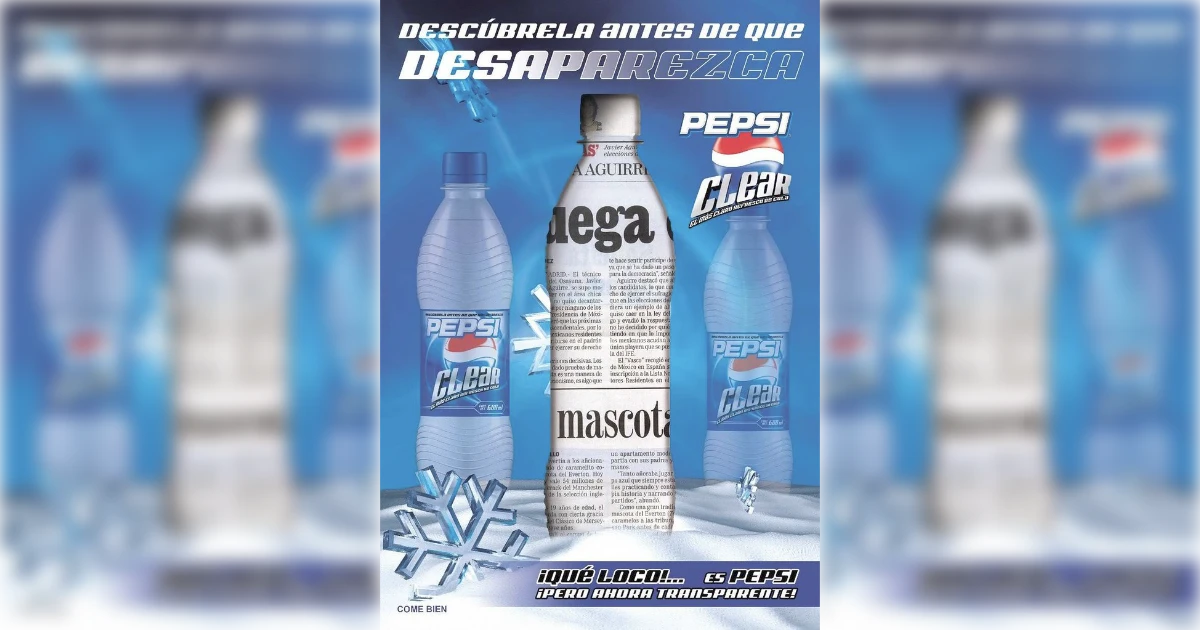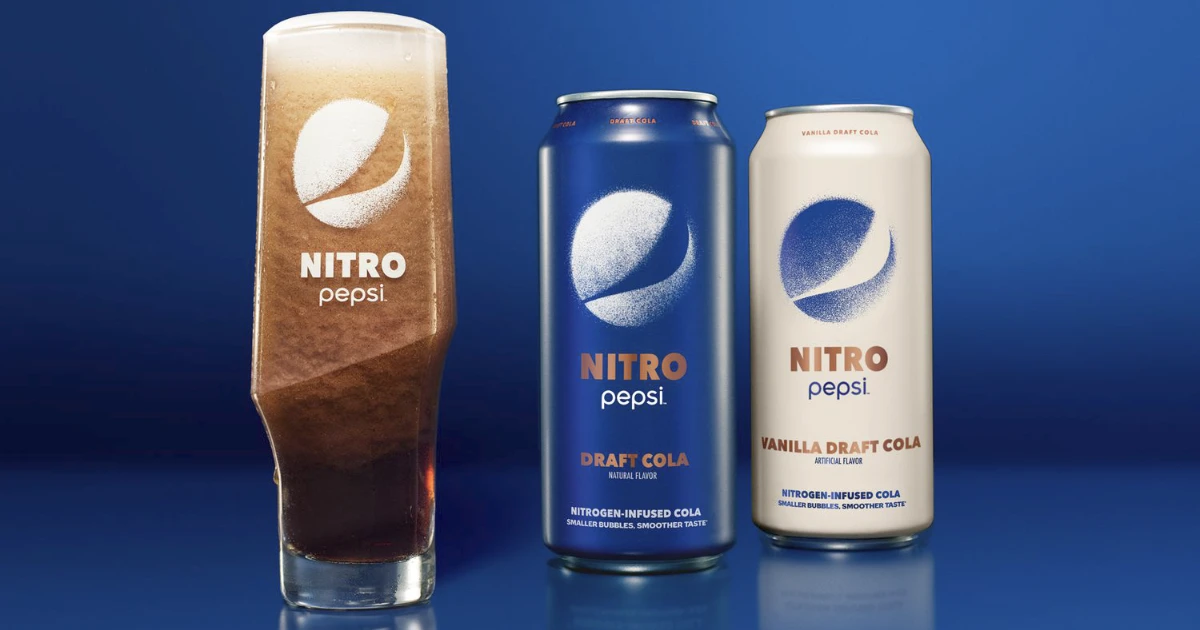.webp)
PepsiCo

Discontinued: 1982
Aspen Soda debuted as PepsiCo's apple-flavored carbonated drink. The soda was discontinued when the company launched Slice, which competed in the apple soda category.

Discontinued: 1984
Teem was a lemon-lime soda that competed with 7-Up and Sprite. Despite 25 years on shelves, it never overtook its competitors.
.webp)
Discontinued: 2009
Slice was PepsiCo's fruit-flavored soda line. These sodas contained 10% real fruit juice, but the juice content was gradually reduced and eliminated by 1990. It launched with lemon-lime and then expanded to orange, apple, and cherry flavors.

Discontinued: 1994
Crystal Pepsi was a clear cola designed to capture the "clear product" trend of the early 1990s. PepsiCo used modified food starch in place of its traditional caramel coloring. It took 1% of all cola sales, but it failed to get any more market share due to its unsavory taste and Coca-Cola’s launch of TaB Clear.

Discontinued: 1994
Crystal From Pepsi was a citrus-cola hybrid reformulation released briefly after Crystal Pepsi's discontinuation. It only lasted several months before joining its cousin, Crystal Pepsi.

Discontinued: 1999
Josta was PepsiCo's first energy drink in America. It contained guarana and caffeine and had a fruity, cola-like taste. However, PepsiCo decided to pursue new directions, and the energy drink was discontinued.

Discontinued: 2000
Storm was a caffeinated lemon-lime soda test marketed as PepsiCo's answer to Sprite. The soda was featured in Star Wars: Episode I marketing with character-themed cans. It featured a subtle, slightly bitter flavor profile. The drink never made it out of test markets.
.webp)
Discontinued: 2023
Sierra Mist was a lemon-lime soda launched yet again to compete with Sprite and 7-Up. The brand underwent multiple reformulations and name changes, including "Mist Twist." Despite 24 years of attempts, it never gained a huge following. Sierra Mist was replaced by Starry in 2023.

Discontinued: 2006
Pepsi Twist was Pepsi with lemon flavoring. It was quite popular internationally and briefly revived as "NFL Kickoff Limited Edition" in 2008. It's still available in some European markets, but it's discontinued forever in US markets.
.webp)
Discontinued: 2004
Pepsi Blue had an electric blue color. It was a berry-flavored cola heavily marketed to teenagers with celebrities like Britney Spears. The artificial blue color and marketing tactics created a backlash. It was briefly revived in 2021, only to be discontinued the same year.

Discontinued: 2025
Mountain Dew Pitch Black was a grape-flavored Mountain Dew that started as a Halloween limited edition in 2004. It was available as an exclusive fountain drink at 7-Eleven until 2025.

Discontinued: 2007
Mountain Dew's first energy drink, MDX, contained guarana, taurine, and ginseng. It was a yellow-green color similar to regular Mountain Dew but with a higher caffeine content. MDX largely failed due to consumer confusion with its name.

Discontinued: 2004, 2006
Pepsi Holiday Spice was a limited holiday edition of Pepsi that featured ginger and cinnamon flavoring with a red-brown color. It was only released for eight weeks during the holiday seasons in 2004 and 2006.

Discontinued: 2005
Pepsi Clear was a transparent cola sold exclusively in Mexico for a limited time.

Discontinued: 2007
Diet Pepsi Jazz was a premium diet cola line targeting consumers with a refined taste. It came in Black Cherry French Vanilla and Caramel Cream flavors. PepsiCo ran urban, jazz-themed advertising but only lasted a year.

Discontinued: 2019
Mountain Dew White Out won the DEWmocracy II consumer voting campaign. It was a white-colored soda with a yuzu lemongrass flavor. Despite winning the contest, it was gradually pulled from the market.

Discontinued: 2010s
All-natural Pepsi Natural was made without high fructose corn syrup or artificial ingredients. It had a mellower flavor profile than regular Pepsi. But nobody seemed to notice.

Discontinued: 2014
The mid-calorie cola Pepsi True was sweetened with a sugar-stevia blend. It was marketed as having 30% less sugar than regular Pepsi. However, its middling position failed to compete with other diet sodas.

Discontinued: 2017
This clear Mountain Dew was made with real cane sugar and sold exclusively in glass bottles. Dewshine was inspired by the brand's moonshine origins. Due to its beer-like packaging, it was criticized for confusing consumers about alcohol content.

Discontinued: 2015
Pepsi Perfect was a limited edition tie-in with "Back to the Future" released on October 21, 2015—the exact date Marty McFly traveled to in the 1989 film. This cola was available only via special promotions and contests.

Discontinued: 2017
Cinnamon-flavored Pepsi Fire was released as a limited summer edition for eight weeks. Consumers complained about the cinnamon flavor that was too mild.

Discontinued: 2024
Pepsi 1894 Series was a craft cola line named after Pepsi's founding year. It featured ginger, citrus, and black currant flavorers. Many used the cola as cocktail mixers.

Discontinued: 2025
This mango-flavored Pepsi was available only in Australia, New Zealand, and other markets. It was discontinued to make room for new Pepsi flavors.

Discontinued: 2025
Pepsi Nitro was a nitrogen-infused cola that created a smoother, creamier texture similar to nitro coffee or Guinness beer. It came in two flavors: original and vanilla. Its innovative technology failed to move sales.

Discontinued: 2022
IHOP partnered with PepsiCo to create a flavor designed to taste like pancakes and maple syrup. Only 2,000 cans were produced, and you could only win a Pepsi Maple Syrup Cola via social media sweepstakes.

Discontinued: 2025
Spark was a raspberry lemonade-flavored Mountain Dew sold exclusively at Speedway gas stations. In 2025, PepsiCo discontinued it due to flavor reductions.